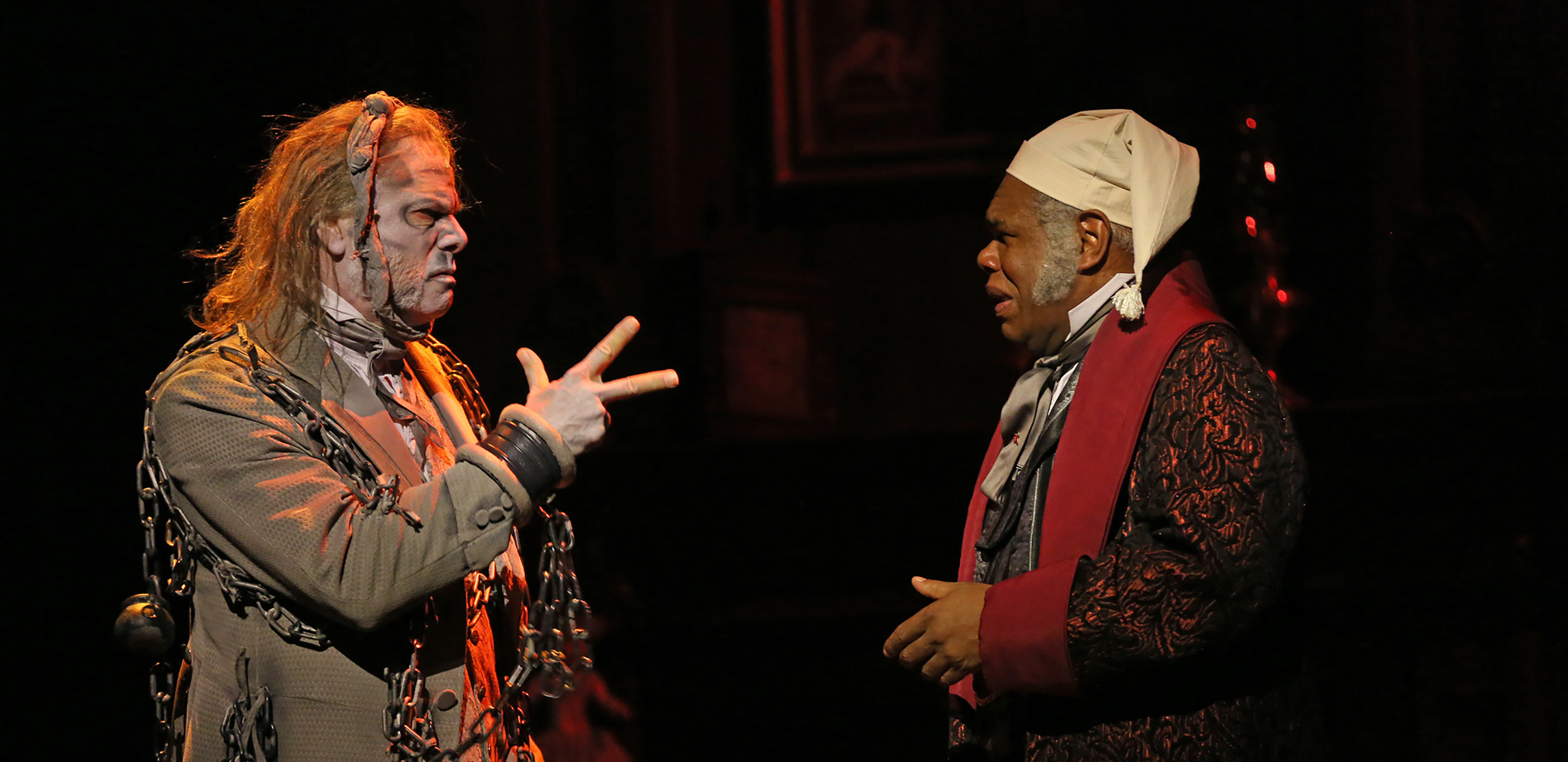
The Ghost of Jacob Marley at Ford’s Theatre: Q&A with Actor Stephen F. Schmidt
This holiday season, Ford’s Theatre presents A Christmas Carol from November 21, 2019, to January 1, 2020. We recently spoke with actor Stephen F. Schmidt who portrays the Ghost of Jacob Marley in this year’s production.

This is the second year you’ve played the Ghost of Jacob Marley, but you’ve been in the cast of A Christmas Carol for many years. What excites you about returning to Dickens’s play year after year?
Stephen F. Schmidt: I have appeared in this version of A Christmas Carol since we opened on November 28, 2009. For the first nine years, I delighted in playing the Clock Vendor or, as I preferred to refer to him (as he referred to himself) as Mr. Marvel! But last year, I was happy to be asked to play Marley’s Ghost. It is always a great pleasure to perform A Christmas Carol at Ford’s! We have not only become a “Christmas Tradition” for families who attend year after year, but we and our audiences have also raised hundreds of thousands of dollars for many local D.C. charities that care for the homeless and their families.
Why do you think this story is so timeless?
Schmidt: Charles Dickens self-published A Christmas Carol on December 19, 1843. From the moment it was published, it was one of his most beloved books. By Christmas Eve of that year, every copy had been sold and, more importantly, charitable giving in London soared. This timeless story still inspires me and our audiences every year.
What are you most looking forward to about returning to play the Ghost of Jacob Marley?
Schmidt: One of the most wonderful things about playing Marley is that all his dialogue is pure Dickens. But not only do I get to set up the entire plot with this lush Dickensian language, but I also get to be the scariest of all the ghosts! Though, the Ghost of Christmas Future might disagree.

Tell us about the “ponderous chains” that you wear in character. What do they represent in the story? And, what’s the trick with being agile on stage with such a costume?
Schmidt: The chains that Marley wears represent his sins of omission he created in his life. When his spirit was supposed to be “walking among his fellowmen” and his “business” should have been “mankind” and “charity, mercy, forbearance and benevolence.” His spirit “never roved beyond the narrow limits of (his and Scrooge’s) money-changing hole.” As for the “trick” of negotiating the chains of the costume, a little rehearsal works wonders. However, the bigger deal is the make-up of Marley and thankfully, I have the artistry of Danna Rosedahl, our superb Make-up Supervisor to help me with that.
How does performing a role on stage at Ford’s Theatre add to the experience of the show for you?
Schmidt: While performing on the stage of Ford’s Theatre over the years, I have often wondered what Mr. Lincoln might have thought about the play we are presenting. While we have no proof that Lincoln ever read A Christmas Carol, it was published during his lifetime and I believe that he would have deeply enjoyed the redemption of Scrooge and his discovery of “The Better Angels of Our Nature.”

Do you have a favorite film or stage memory of this Christmas story?
Schmidt: The year before we premiered this Carol at Ford’s, a wonderful book titled The Man Who Invented Christmas by Les Standiford was published. This is the incredible story of what Charles Dickens had to go through in order to get A Christmas Carol published. Imagine my delight when a film based on this book came out in 2017! This is a fantastic motion picture that contains my absolute favorite film performance of Scrooge by the magnificent Christopher Plummer. I highly recommend this film.
Washington, D.C., connections to A Christmas Carol that Stephen loves:
- On February 3, 1868, Charles Dickens himself read the story at Carroll Hall at 924 G Street, NW— one block away from Ford’s.
- FDR had two Christmas traditions while living in the White House. One was hanging stockings up in the private residence and the other was his reading of A Christmas Carol to his grandchildren. According to an article by John Nichols published in The Nation, FDR said in his 1939 Christmas Fire-Side Chat:
“A Christmas rite for me is always to reread that immortal little story by Charles Dickens, A Christmas Carol. Reading between the lines and thinking as I always do of Bob Cratchit’s humble home as a counterpart of millions of our own American homes, the story takes on a stirring significance to me. Old Scrooge found that Christmas wasn’t a humbug. He took to himself the spirit of neighborliness.”
A version of this story appeared in the Ford’s Theatre playbill for August Wilson’s “Fences.”
Lauren Beyea was Associate Director of Communications and Marketing at Ford’s Theatre, where she oversaw media relations.

